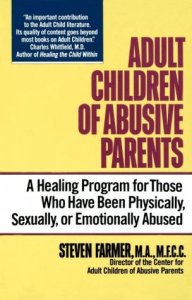Title: Adult Children of Abusive Parents: A Healing Program for Those Who Have Been Physically, Sexually, or Emotionally Abused
Author: Steven Farmer
Genre: Self-Help
I don’t like categorizing this as Self-Help because of the connotations of the modern Self-Help genre, but this is Self-Help in its most basic meaning: A book with practical instructions to help yourself overcome childhood abuse.
Trigger Warnings: Child abuse, child sexual abuse/pedophilia, emotional abuse, physical abuse, child neglect, cisnormative language (descriptions of abuse are extended and often graphic but done with very clinical language and obviously condemned)
Back Cover:
A history of a childhood abuse is not a life sentence. Here is hope, healing, and a chance to recover the self lost in childhood. Drawing on his extensive work with Adult Children, and on his own experience as a survivor of emotional neglect, therapist Steven Farmer demonstrates that through exercises and journal work, his program can help lead you through grieving your lost childhood, to become your own parent, and integrate the healing aspects of spiritual, physical, and emotional recovery into your adult life.
Review:
I was going to start this review with, “I can’t help comparing every book in this vein that I read to The Body Keeps the Score since that was the first one I read on this topic,” but it turns out there’s very few comparisons to be drawn. There are no studies or scientific inquiries in this book, no discussions of past or current research, and no focus on anything beyond the emotional and behavioral aspects of having been abused.
This is a therapy program in a book, basically. It starts off with describing some dynamics different varieties of abusive homes fall into and the different ways you might have responded (the book is written addressing you the former abused child). It discusses how abuse splits you into three “children” inside – your Natural Child, emotionally free, untraumatized, and not reacting to abuse; your Controlling Child, the one who took over to protect you from the abuse and is now making a mess of your adult life; and a third one that I don’t remember because it hardly got mentioned.
The bulk of this book is a step-by-step program to integrate all three “inner children” and let your Natural Child drive the boat most of the time. It’s very comprehensive, not only addressing emotional symptoms but also practical social symptoms like struggling to make friends and being afraid of touch. I think in an ideal world you’d go through this guided by a therapist who can help you deal with things that come up, but therapy is not affordable for everyone and this book seems doable on your own
There is no nuance in this book. Steven leaves no room for complexity, differing situations, or other reactions outside his framework, and the healing program he sets out is very much of the This Is The One And Only Way To Do It variety. That said, this book was originally published in the 1980s, and understandings of and treatment for mental health problems and childhood abuse recovery have come a long way since then. I think the lack of nuance and flexibility is just the book being a product of its time.
I still think this is an incredibly valuable book. I always appreciate books that are practical, and it doesn’t get more practical than two-thirds of the book being a step-by-step program with exercises and journal prompts. I would love to tell everyone to find a good therapist to help them through this process, but if you can’t afford that, I found this book for $2 at a used bookstore. I’d call this the next best thing to an actual therapist, and a whole lot cheaper.
Endnote: This book seems to be the only sane thing Steven Farmer has written. Everything else on his website is about spirit animals and earth magic and such. I have to assume he went into the magic nonsense after he wrote this book, because he does have genuine psychology credentials and this book is very sane, practical, and useful in the real world.

